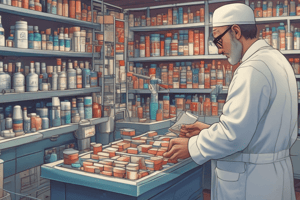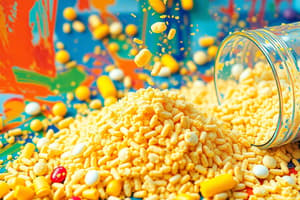Podcast
Questions and Answers
What is the primary function of magnesium stearate in tablet formulations?
What is the primary function of magnesium stearate in tablet formulations?
- Binder
- Diluent/Filler
- Lubricant (correct)
- Active ingredient
Which ingredient in the Paracetamol tablet acts as a diluent/disintegrant?
Which ingredient in the Paracetamol tablet acts as a diluent/disintegrant?
- Acetaminophen
- Starch paste
- Lactose (correct)
- Talc
What is the purpose of using corn starch in the Amoxicillin capsule formulation?
What is the purpose of using corn starch in the Amoxicillin capsule formulation?
- Flavoring agent
- Diluent/Disintegrant (correct)
- Binder
- Active ingredient
Which step is NOT a part of the manufacturing process for tablets?
Which step is NOT a part of the manufacturing process for tablets?
Which ingredient in the Soda Mint Tablet serves as a sweetening agent?
Which ingredient in the Soda Mint Tablet serves as a sweetening agent?
What could be a consequence of inadequate blending in the manufacturing process?
What could be a consequence of inadequate blending in the manufacturing process?
What is the main role of the dry coating step in tablet manufacturing?
What is the main role of the dry coating step in tablet manufacturing?
Which capsule size has the highest approximate weight capacity?
Which capsule size has the highest approximate weight capacity?
Flashcards are hidden until you start studying
Study Notes
Introduction to Pharmaceutical Manufacturing
- Focuses on producing pharmaceutical products with adherence to Quality Assurance (QA) and current Good Manufacturing Practices (cGMP).
Minimum Labeling Requirement
- Ensures that all pharmaceutical products meet legal and regulatory standards for information provided to consumers.
Formulation Development
- Involves selecting Active Pharmaceutical Ingredients (API) and excipients for effective product formulation.
API Selection
- Critical to define the desired therapeutic effect of the drug.
Excipients Selection
- Choosing substances that aid in drug formulation without therapeutic effects but enhance stability, delivery, and absorption.
Preformulation Studies
- Assess the physical and chemical properties of APIs to guide formulation development.
Transition from Lab Scale to Manufacturing Scale
- Involves scaling up processes while maintaining product quality and consistency.
Raw Materials and Packaging Materials
- Need to be sourced meticulously to comply with regulatory standards.
Quality Assurance
- Integral part of the pharmaceutical manufacturing process ensuring product safety, efficacy, and quality.
cGMP
- Guidelines outlining the processes, procedures, and documentation needed for manufacturing quality pharmaceuticals.
Tablets Manufacturing Process
- Involves several steps: mixing, blending, granulation, drying, compression, and packaging.
Manufacturing Process Flow Chart for Tablets
- Sequence of activities:
- Requisition and testing of raw materials
- Weighing and blending of components
- Granulation and optional coating
- Compression and final packaging
- Quality release prior to distribution
Paracetamol Tablet Ingredients
- Acetaminophen: Active ingredient for pain relief
- Lactose: Diluent/filler that adds bulk
- Corn starch: Acts as disintegrant
- Starch paste: Serves as a binder
- Talc: Functions as glidant/lubricant
- Magnesium stearate: Lubricant aiding tablet formation
Soda Mint Tablet Ingredients
- Sodium bicarbonate: Active ingredient
- Peppermint oil: Provides flavoring
- Saccharin: Serves as a sweetening agent
- Purified talc: Also acts as a lubricant
- Acacia solution: Functions as a binder
Hard-Gelatin Capsules Manufacturing
- Steps include blending and mixing of ingredients, filling capsules, sealing, and sorting.
Manufacturing Process Flow Chart for Capsules
- Workflow includes:
- Requisition and quality testing of materials
- Weighing and preparation of filling materials
- Capsule filling process
- Polishing and packaging
- Release for distribution
Amoxicillin Capsule Ingredients
- Amoxicillin: Active antibiotic ingredient
- Cornstarch: Acts as a diluent/disintegrant
- Magnesium stearate: Serves as a lubricant
Hard Gelatin Capsule Size and Capacity
- Size 000: Volume 1.37 – 1.40 mL, weight capacity 800 – 1600 mg
- Size 00: Volume 0.95 – 1.00 mL, weight capacity 600 – 1100 mg
- Size 0: Volume 0.68 – 0.70 mL, weight capacity 400 – 800 mg
- Size 1: Volume and weight capacity similar to those listed.
Studying That Suits You
Use AI to generate personalized quizzes and flashcards to suit your learning preferences.




